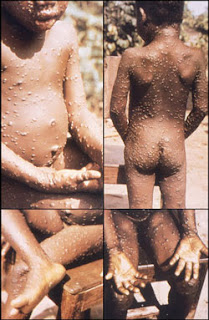Monkeypox is a rare disease that is caused by infection with monkeypox virus. Monkeypox virus belongs to the Orthopoxvirus genus in the family Poxviridae. The Orthopoxvirus genus also includes variola virus (the cause of smallpox), vaccinia virus (used in the smallpox vaccine), and cowpox virus.
Monkeypox was first discovered in 1958 when two outbreaks of a pox-like disease occurred in colonies of monkeys kept for research, hence the name ‘monkeypox.’ The first human case of monkeypox was recorded in 1970 in the Democratic Republic of Congo during a period of intensified effort to eliminate smallpox. Since then monkeypox has been reported in humans in other central and western African countries (see table below). The 2003 outbreak in the United States is the only time monkeypox infections in humans were documented outside of Africa.
The natural reservoir of monkeypox remains unknown. However, African rodent species are expected to play a role in transmission.
It was first descovered in Nigeria in 1971 and 1978 respectively and just few days ago the virus as affected some individuals in Bayelsa. Below are what to do to avoid contacting the desease:
#1. Don’t eat bush meat
Monkeypox is known to be spread to humans from rodents like rats and squirrels. The virus is known to still be present in dead animals that were infected. The consumption of the popular “bush meat” delicacy should be avoided during this period. Even the Federal Government of Nigeria issued a statement warning people about the dangers of eating bush meat during this outbreak of Monkeypox.
#2. Avoid contact with sick animals
Monkeypox has been isolated in rodents and monkeys. Generally, you will want to avoid close contact with any sick animals during this period. The main form of transmission of this disease is from animals to humans. Person-to-person transmission makes only about 10-30% of all transmissions in human outbreaks.
#3. Avoid close contact with infected persons
The virus is usually present in the blood, body fluids and secretions of people who are infected. This includes saliva, tears and urine.
Close contact with infected droplets from coughs and sneezes can also spread the disease.
#4. Wash your hands regularly.
One important way to protect yourself and family members from diseases in general is to wash your hands optimally. Handwashing helps to prevent many diseases, not just monkeypox.
Generally, you should wash your hands after visiting the toilet, after touching animals, before cooking and before eating.

Comments
Post a Comment